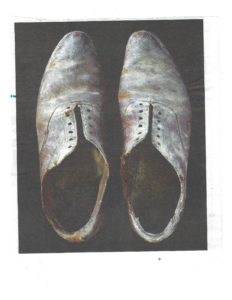Nancy Kunnmann has been writing poems for several years. Several of the ones she shared at the beginning of my Poetry Workshop at LLI were about her grandchildren. During this ten-week class, participants have read and discussed works by Emily Dickinson, William Shakespeare, William Carlos Williams, Wendell Berry, Maya Angelou, as well ones and by the other writers of our class. During the three-month process, Nancy’s poems, like the other writers, have been more powerful and insightful each week. The new tools she has learned and the poetry exposure to master writers have enabled her to move beyond mainly writing about her immediate family experiences and onto writing a broader range of topics. See my 4/18/2016 Litchatte.com blog called “A Shooting Star…” about a recent poem that she wrote about a retiring ballet dancer. In today’s columns, I will be sharing and discussing her most recent poem, Etches. The woman pictured in the photograph below is not the same one who Nancy visited.
Etches by Nancy Kunnmann
In the lines of her face
I saw the path she had chosen to take
Or perhaps
Was chosen for her.
Her life
So different from mine
Or maybe not
When a moment of time
Stood still.
Erase what you can
Before they deepen
No amount of pressure
Will bring back the clarity.
I stare
I whisper a little prayer
It passes through the
Heavy
Black metal bars
That now cover her face.
Before the last class of our workshop, I had asked everyone to write a poem about a subject that was important to them. In one of our first classes, I had discussed the importance of opening lines in helping to set a poem’s context and in capturing the reader’s attention. Nancy quickly draws readers’ into Etches with her opening words, “I see the lines of her face.” Are they caused by maturity or are shadows from bars blocking access to her countenance? The poet writes that the woman had chosen to take the path that she is now on, but also suggests that the woman might not have had much choice in winding up in jail. Instead of pitying this woman, the writer realizes that her life is only different from the woman she beholds because of a choice that the prisoner might have been made in a single moment. Big choices are sometimes made for all of us as a result of small choices we make in a split second. Indeed, she could have easily been a woman sitting in a jail cell. Perhaps, many readers can also identify with this sentiment. We all make some important choices that set our lives moving in a certain direction, but few of us can control how either the positive or negative consequences of our previous actions. In the third stanza, the poet observes that no amount of covering, or perhaps makeup, can erase the lines that are now fixed on the woman’s face;. they are part of her life now. Perhaps, the woman has conveyed to the writer that she little chance of getting out of prison anytime soon. The observer feels powerless to overcome the hopelessness she senses from the woman. At the end of the visit, the black bars have taken on the thick black form of heavy metal, which completely covers the woman’s face. Even the prayers that the visitor offered would have difficulty reaching the woman through those thick bars.
As we were discussing her poem, Nancy explained that she wrote Etches after recalling the moving experience she had visiting a woman in prison. She said that her visit was arranged by a priest. I noted that poem uses a technique that we discussed earlier in the class, i.e., not directly stating the main subject. I stated that I thought that Etches has a great power and subtlety of form, content, and poetic technique. The other poets in the class readily agreed. I will be posting one more Blog on our Spring 2016 LLI Poetry Workshop soon. However, I encouraged the participants to continue writing poems all summer. Perhaps, some of them will appear on this Blog. I do plan to offer the workshop again in the Fall of 2016. If you would like to automatically receive more of their poems or Blogs on the other postings from Litchatte.Com, please send your email to me via the dialogue box to the right of this Blog.



